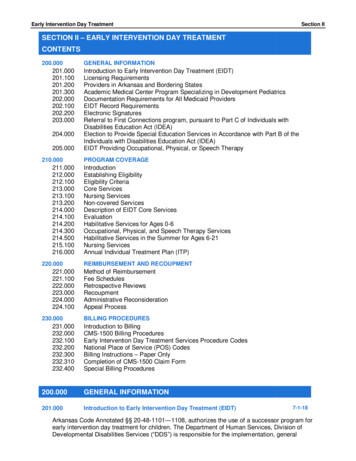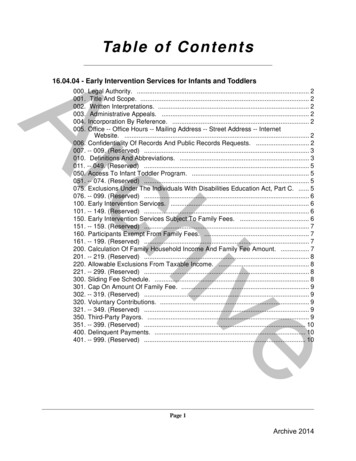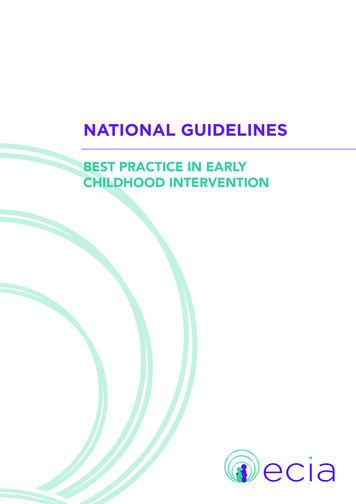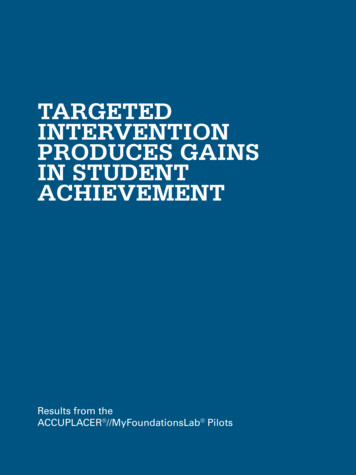
Transcription
Early Intervention Day TreatmentSection IISECTION II – EARLY INTERVENTION DAY ERAL INFORMATIONIntroduction to Early Intervention Day Treatment (EIDT)Licensing RequirementsProviders in Arkansas and Bordering StatesAcademic Medical Center Program Specializing in Development PediatricsDocumentation Requirements for All Medicaid ProvidersEIDT Record RequirementsElectronic SignaturesReferral to First Connections program, pursuant to Part C of Individuals withDisabilities Education Act (IDEA)Election to Provide Special Education Services in Accordance with Part B of theIndividuals with Disabilities Education Act (IDEA)EIDT Providing Occupational, Physical, or Speech TherapyPROGRAM COVERAGEIntroductionEstablishing EligibilityEligibility CriteriaCore ServicesNursing ServicesNon-covered ServicesDescription of EIDT Core ServicesEvaluationHabilitative Services for Ages 0-6Occupational, Physical, and Speech Therapy ServicesHabilitative Services in the Summer for Ages 6-21Nursing ServicesAnnual Individual Treatment Plan (ITP)REIMBURSEMENT AND RECOUPMENTMethod of ReimbursementFee SchedulesRetrospective ReviewsRecoupmentAdministrative ReconsiderationAppeal ProcessBILLING PROCEDURESIntroduction to BillingCMS-1500 Billing ProceduresEarly Intervention Day Treatment Services Procedure CodesNational Place of Service (POS) CodesBilling Instructions – Paper OnlyCompletion of CMS-1500 Claim FormSpecial Billing Procedures200.000GENERAL INFORMATION201.000Introduction to Early Intervention Day Treatment (EIDT)7-1-18Arkansas Code Annotated §§ 20-48-1101—1108, authorizes the use of a successor program forearly intervention day treatment for children. The Department of Human Services, Division ofDevelopmental Disabilities Services (“DDS”) is responsible for the implementation, general
Early Intervention Day TreatmentSection IIadministration, and oversight of the successor program for early intervention day treatment forchildren. Division of Provider Services and Quality Assurance (DPSQA) is responsible forcertification and licensure criteria as the regulatory entity governing this successor program.Child Health Management Services (CHMS) means an array of clinic services for childrenintended to provide full medical multidiscipline diagnosis, evaluation, and treatment ofdevelopmental delays in Medicaid recipients who meet eligibility criteria and for whom thetreatment has been deemed medically necessary.Developmental Day Treatment Clinic Services (DDTCS) for children means early interventionday treatment provided to children by a nonprofit community program that is licensed to providecenter-based community services by the Division of Developmental Disabilities.For both CHMS and DDTCS for children, early intervention day treatment means servicesprovided by a pediatric day treatment program run by early childhood specialists, overseen by aphysician and serving children with developmental disabilities, developmental delays, and amedical condition.For both CHMS and DDTCS for children, early intervention day treatment includes withoutlimitation diagnostic, screening, evaluation, preventive, therapeutic, palliative, rehabilitative andhabilitative services, including speech, occupational, and physical therapies and any medical orremedial services recommended by a physician for the maximum reduction of physical or mentaldisability and restoration of the child to the best possible functional level. Early Intervention daytreatment is available year-round to children aged 0-6; and in the summer months for childrenaged 6-21.CHMS, DDTCS for children or the successor programs constitute the State’s early interventionday treatment program.Successor program means a program that provides early intervention day treatment to childrenthat is created to replace in whole the CHMS and DDTCS for children programs. For profit andnonprofit providers from CHMS and DDTCS programs may participate, conditioned on programcompliance.Early Intervention Day Treatment (EIDT) is the successor program under Ark. Code Ann. §§ 2048-1101—1108.Determination of underserved status for expansion of servicesAn expansion of early intervention day treatment services in a county is necessary when theDivision of Developmental Disabilities Services determines that a county is underserved withregard to:A.Early intervention day treatment services as defined above; orB.A specific category of early intervention day treatment services currently offered to childrenwith developmental disabilities or delays.201.100Licensing Requirements7-1-18EIDT providers must meet the provider participation and enrollment requirements containedwithin Section 140.000 of this manual as well as the following criteria to be eligible to participatein the Arkansas Medicaid Program:A.Each provider of EIDT must be licensed as an Early Intervention Day Treatment providerby the Arkansas Department of Human Services, Division of Provider Services and QualityAssurance (DPSQA).B.Each provider of EIDT must meet all child care licensing rules, as well as all health andsafety requirements, as applicable under local, state, and federal laws, rules andregulations, unless otherwise specified in this manual.
Early Intervention Day TreatmentC.Section IIA copy of all relevant current licenses and certifications must accompany the providerapplication and the Medicaid contract.EIDT providers may furnish and claim reimbursement for covered services in the ArkansasMedicaid Program subject to all requirements and restrictions set forth and referenced in thismanual. Claims must be filed according to the specifications in this manual. Covered servicesmust be medically necessary and prescribed by the child’s primary care physician (PCP). Whenreferring to or prescribing EIDT services, the PCP shall not make any self-referrals in violation ofstate or federal law.201.2007-1-18Providers in Arkansas and Bordering StatesProviders in Arkansas and the six bordering states (Louisiana, Mississippi, Missouri, Oklahoma,Tennessee and Texas) within fifty (50) miles of the state line may be enrolled as EIDT providersif they meet all Arkansas Medicaid participation requirements.201.3007-1-18Academic Medical Center Program Specializing in DevelopmentPediatricsAn academic medical center program specializing in developmental pediatrics is eligible forreimbursement as an EIDT provider if it is certified as an Academic Medical Center by DPSQA.An Academic Medical Center must meet the following requirements:A.Is located in the state of Arkansas;B.Provides multi-disciplinary diagnosic and evaluation services to children throughout thestate of Arkansas;C.Specializes in developmental pediatrics;D.Serves as a large, multi-referral program, as well as a referral source for other, nonacademic EIDT programs within the state;E.Is staffed to provide training of pediatric residents and other professionals in the multidisciplinary diagnostics and evaluation of children with developmental disabilities and otherspecial health care needs; andF.Does not provide treatment services to children.Only an EIDT that is certified as an Academic Medical Center Program may bill the followingcodes, in addition to those listed in Section 232.100:90791, U996101, U1, UA9920299215, U19917390791, U1, 01 UA96118992059258796101, UA, UB9920199205, U195961202.000Documentation Requirements for All Medicaid Providers7-1-18Documentation and provider participation requirements are detailed within Section 140.000,Provider Participation, of this Manual.202.100EIDT Record Requirements7-1-18
Early Intervention Day TreatmentSection IIA.Providers must establish and maintain medical records for each beneficiary that includedocumentation of medical necessity for all services billed.B.Each beneficiary’s record must include the results of the developmental screen performedby the Department of Human Services’ Third Party Vendor, or an approved waiver of thatscreen in accordance with the Provider Manual Governing Independent Assessments andDevelopmental Screens.C.Sufficient, contemporaneous written documentation for each beneficiary must be presentand must support the necessity of all services provided. This requirement applies to coreservices and optional services. Refer to Section 210.000 of this manual for description ofservices and documentation required.D.Service documentation for each beneficiary must, at a minimum, include the followingitems:202.2001.The specific services furnished daily;2.The date and beginning and ending time the services were performed daily;3.Name(s) and credential(s) of the person(s) providing the service(s), daily;4.The relationship of the daily services to the goals and objectives described in thebeneficiary’s individual treatment plan (ITP); and5.At a minimum, weekly progress notes describing each beneficiary’s status withrespect to his or her goals and objectives that are signed or initialed by the person(s)providing the service(s),Electronic Signatures7-1-18Medicaid will accept electronic signatures if the electronic signatures comply with Arkansas CodeAnn. §§ 25-31-103 et seq.203.000Referral to First Connections program, pursuant to Part C ofIndividuals with Disabilities Education Act (IDEA)7-1-18DDS is the lead agency responsible for the general administration and supervision of theprograms and activities utilized to carry out the provisions of Part C of the IDEA. FirstConnections is the DDS program in Arkansas that administers, monitors, and carries out all PartC of IDEA activities and responsibilities for the state. The First Connections program ensuresthat appropriate early intervention services are available to all infants and toddlers from birth tothirty-six (36) months of age (and their families) that are suspected of having a developmentaldelay.Federal regulations under Part C of the IDEA require “primary referral sources” to refer any childsuspected of having a developmental delay or disability for early intervention services. An EIDTis considered a primary referral source under Part C of IDEA regulations.Each EIDT must, within two (2) working days of first contact, refer all infants and toddlers frombirth to thirty-six (36) months of age for whom there is a diagnosis or suspicion of adevelopmental delay or disability. The referral must be made to the DDS First ConnectionsCentral Intake Unit, which serves as the State of Arkansas’ single point of entry to minimizeduplication and expedite service delivery. Each EIDT is responsible for maintainingdocumentation evidencing that a proper and timely referral to First Connections has been made.204.000Election to Provide Special Education Services in Accordance withPart B of the Individuals with Disabilities Education Act (IDEA)7-1-18
Early Intervention Day TreatmentSection IILocal Education Agencies (“LEA”) have the responsibility to ensure that children ages three (3)until entry into Kindergarten who have or are suspected of having a disability under Part B ofIDEA (“Part B”) receive a Free Appropriate Public Education. The Arkansas Department ofEducation provides each EIDT with the option of participating in Part B as an LEA. Participationas an LEA requires an EIDT to provide special education and related services in accordancewith Part B (“Special Education Services”) to all children with disabilities it is serving aged three(3) until entry into Kindergarten. A participating EIDT is also eligible to receive a portion of thefederal grant funds made available to LEAs under Part B in any given fiscal year.Each EIDT must therefore make an affirmative election to either provide or not provide SpecialEducation Services to all children with disabilities it is serving aged three (3) until entry intoKindergarten.For further clarification related to Special Education Services refer to the DPSQA EIDT LicensureManual.View or print the Arkansas Department of Education Special Education contactinformation.205.000EIDT Providing Occupational, Physical, or Speech Therapy7-1-18Services available through EIDT include occupational, physical and speech therapy andevaluation as an essential component of the individual treatment plan (ITP) for an individualaccepted for developmental disabilities services.An EIDT facility may contract with or employ qualified therapy practitioners. The individualtherapy practitioner who actually performs a service on behalf of the EIDT facility must beidentified on the claim as the performing provider when the EIDT facility bills for that service.This action is taken in compliance with the federal Improper Payments Information Act of 2002(IPIA), Public Law 107-300 and the resulting Payment Error Rate Measurement (PERM)program initiated by the Centers for Medicare and Medicaid Services (CMS).If the facility contracts with a qualified therapy practitioner, the criteria for group providers oftherapy services apply (See Section 201.100 of the Occupational, Physical, Speech TherapyServices manual). The qualified therapy practitioner who contracts with the facility must beenrolled with Arkansas Medicaid. The contract practitioner who performs a service must be listedas the performing provider on the claim when the facility bills for that service.If the facility employs a qualified therapy practitioner, that practitioner has the option of eitherenrolling with Arkansas Medicaid or requesting a Practitioner Identification Number (View orprint form DMS-7708). The employed practitioner who performs a service must be listed as theperforming provider on the claim when the facility bills for that service.210.000PROGRAM COVERAGE211.000Introduction7-1-18Medicaid assists eligible individuals to obtain medical care in accordance with the guidelinesspecified in Section I of this Manual. Reimbursement may be made for medically necessary,covered Early Intervention Day Treatment Services provided to Medicaid beneficiaries, aged 021, at qualified provider facilities. Services may be provided year-round to beneficiaries aged 06, and during the summer months for beneficiaries aged 6-21.212.000Establishing Eligibility7-1-18
Early Intervention Day TreatmentSection IIReimbursement for covered services will be approved only when the beneficiary’s physician hasdetermined that EIDT services are medically necessary:A.The physician must identify the individual’s medical needs that EIDT services can address;B.To initiate EIDT services, the physician must issue a written prescription. The prescriptionfor EIDT services is valid for one (1) year, unless a shorter period is specified. Theprescription must be renewed at least once a year for EIDT services to continue;C.Each prescription must be dated and signed by the physician with his or her originalsignature to be considered valid; andD.For all beneficiaries who are enrolling in habilitative services for children (0-6), theprescription must be based on the results of an age appropriate developmental screenperformed by DHS’ Third Party Assessor that indicates the beneficiary has been referredfor further evaluation, as well as the results of the full evaluation.If the child has been diagnosed with one of the following diagnoses or has been deemed tomeet the institutional level of care (as shown on a DMS-703), , the physician or EIDTprovider may send all relevant documentation to DHS’ Third Party Vendor for review in lieuof referring the patient for a developmental screen:1.Intellectual Disability2.Spina bifida3.Cerebral palsy4.Autism spectrum disorder5.Epilepsy/seizure disorder6.Down syndromeA clinician will review the submitted documentation to determine if a developmental screen isneeded.212.100Eligibility Criteria7-1-18To receive EIDT day habilitation services, the beneficiary must have a documenteddevelopmental disability or delay, as shown on the results of an annual comprehensivedevelopmental evaluation. The comprehensive annual developmental evaluation must include anorm referenced (standardized) evaluation and a criterion referenced evaluation. The normreferenced evaluation must be the most current addition of the Battelle Developmental Inventory(BDI). The Criterion referenced evaluation must be the most current edition of one of thefollowing and appropriate for the child’s age:A.Hawaii Early Learning Profile (HELP)B.Learning Accomplishment Profile (LAP)C.Early Learning Accomplishment Profile (E-LAP)D.Brigance Inventory of Early Development (IED)The evaluator must document that the test protocols for each instrument used were followed,and that the evaluator met the qualification to administer the instrument. The length of theservice may not exceed one unit per date of service. The billable unit includes time spentadministering the test, time spent scoring the test and/or time spent writing a test report.Services are covered once each calendar year if the service is deemed necessary.A.Evaluation that shows:
Early Intervention Day TreatmentB.Section II1.For ages 0-36 months, a score of 25% or greater delay in at least two of fivedomains: motor, social, cognitive, self-help/adaptive, or communication on both theBDI and the criterion referenced;2.For ages 3-6, a score of at least two standard deviations below the mean in at leasttwo of the five domains: motor, social, cognitive, self-help/adaptive, orcommunication on the BDI and 25% or greater delay on the criterion referenced test;3.The same two areas of delay on both the BDI and the criterion referenced test.In addition to having a documented developmental disability or delay, the beneficiary musthave a documented need for at least one of the following, as shown on a full evaluation forthat service:1.Physical therapy,2.Occupational therapy,3.Speech therapy, or4.Nursing servicesPhysical, Occupational and Speech Therapy evaluations must meet qualifying scores aswritten in the Medicaid Occupational, Physical and Speech Therapy Provider manual.For children who have a documented delay in the areas of social emotional and adaptiveonly, a referral must be made to an appropriate head start, home visiting, or EarlyInterventions or Part B program. This referral must be documented and placed in thechild’s evaluation record.C.It is presumed that no more than eight (8) hours of EIDT core and optional servicescombined per day is medically necessary.D.EIDT day habilitation prescription is valid for one (1) year.E.Children who are enrolled in a DDTCS or CHMS as of July 1, 2018, and meet the eligibilitycriteria promulgated on October 1, 2017, for either the DDTCS children’s program or theCHMS program, will be allowed enrollment in EIDT until June 30, 2019, as long as theymeet the former criteria on July 1, 2018, and continue to meet the former criteria until June30, 2019.213.000Core Services7-1-18EIDT core services are provided in certified clinics and include the following core services when(a) prescribed by the beneficiary’s physician; (b) medically necessary; (c) provided on anoutpatient basis; and (d) provided in accordance with a written Individual Treatment Plan (ITP)and this Manual:A.Year-round Day Habilitative services and evaluation for beneficiaries aged 0-6, up to five(5) hours per day without an approved extension of benefits;B.Speech evaluation and speech therapy up to ninety (90) minutes per week without priorapproval/extension of benefits;C.Physical evaluation and physical therapy up to ninety (90) minutes per week without priorapproval/extension of benefits;D.Occupational evaluation and occupational therapy up to ninety (90) minutes per weekwithout prior approval/extension of benefits; andE.Day Habilitative Services in the summer for beneficiaries aged 6-21.
Early Intervention Day Treatment213.100Nursing ServicesSection II7-1-18EIDT nursing services are available for beneficiaries who are medically fragile, have complexhealth needs, or both, if prescribed by the beneficiary’s PCP in accordance with this manual.213.200Non-covered Services7-1-18Nothing other than the services listed in Sections 213.100 and 213.200 are covered as an EIDTservices, including educational services, supervised living services, and inpatient services.214.000Description of EIDT Core Services214.100Evaluation7-1-18The evaluation service is a component of the process of determining a person’s eligibility forhabilitative services and habilitative services in the summer. Evaluation services are coveredseparately from habilitative services.Evaluation services are covered once per calendar year, if the service is deemed medicallynecessary by a physician. For children age 18 or less who are enrolling (including those whohave been discharged and are re-enrolling) in the habilitative services program (ages 0-6),medical necessity of evaluation services is determined by an age appropriate developmentalscreen conducted in accordance with the Manual Governing Independent Assessments andDevelopmental Screens. Children who are only enrolled in the summer habilitation services donot have to undergo a developmental screen.If the physician or EIDT provider believes that the beneficiary has a significant, documenteddevelopmental diagnosis, disability or delay such that he or she does not need a developmentalscreen, the physician or EIDT provider may send relevant documentation for review by aclinician. The clinician will determine the necessity of a developmental screen.Evaluation services are reimbursed on a per unit basis, with one unit equal to 15 minutes. Thereis a maximum of four (4) units per year. The billable unit includes time spent administering thetest, scoring the test, and/or writing a test report.214.200A.Habilitative Services for Ages 0-67-1-18Habilitative Services are instruction in areas of cognition, communication, social/emotional,motor, and adaptive skills; or to reinforce skills learned and practiced in occupational,physical or speech therapy. Habilitation activities must be designed to teach habilitationgoals and objectives specified in the client’s Individual Treatment Plan (ITP). (Refer toSection 216.000 of this manual.)Habilitative Services may be provided to a child before they reach school age, includingchildren who are aged 5-6, if the kindergarten year has been waived.B.Habilitative services must be overseen by an Early Childhood Development Specialist(ECDS) who:1.Is a licensed Speech Therapist, Occupational Therapist, Physical Therapist, orDevelopmental Therapist; or2.Has a Bachelor’s Degree, plus one of the following:(a)Current Arkansas state certification in Early Childhood or Early ChildhoodSpecial Education;(b)A current Child Development Associate Certificate;(c)A current Birth to pre-K credential; or
Early Intervention Day Treatment(dSection IIDocumented experience working with children with special needs and twelve(12) hours of completed college courses in any of the following areas:(i)Early Childhood;(ii)Child Development;(iii)Special Education/Elementary Education; or(iv)Child and Family Studies.There must be one (1) ECDS for every forty (40) beneficiaries enrolled at an EIDT site.C.The following staff to beneficiary ratio must be observed:Age GroupRatio0-18 months1:418-36 months1:53-4 years1:74-6 years1:81.2.D.During naptime:a.A minimum of 50% of the staff shall remain with children 3 years of age andolder.b.Staff ratios must be maintained at 100% for children under the age of 3.Additional staff must be provided for children with significant medical or behaviorneeds that require more individual attention.One unit of habilitative services equals one hour. No more than five (5) units of habilitativeservices may be billed per day without an extension of benefits. This includes naptime.214.300Occupational, Physical, and Speech Therapy Services7-1-18Occupational, physical, and speech therapy services must be medically necessary to thetreatment of the beneficiary’s developmental disability or delay, in accordance with the MedicaidProvider Manual for Occupational, Physical, and Speech Therapy Services, Section II. Adiagnosis alone is not sufficient documentation to support the medical necessity of therapy.214.500Habilitative Services in the Summer for Ages 6-217-1-18Beneficiaries aged 6-21 may receive day habilitative services during the months of May, June,July, and August, when school is not in session if theyA.Have one of the following diagnoses (as defined in DDS Policy 1035):1.Intellectual Disability2.Spina Bifida3.Cerebral Palsy4.Autism Spectrum Disorder5.Epilepsy/Seizure Disorder6.Down Syndrome
Early Intervention Day Treatment7.Section IIA condition found to be closely related to intellectual disability because it results inimpairment of general intellectual functioning or adaptive behavior similar to thosepersons with intellectual disability or requires treatment and services similar to thoserequired for such persons. This determination must be based on the results of ateam evaluation including at least a licensed Physician and a licensed Psychologist.ANDB.Receive at least one of the following services:1.Occupational Therapy2.Speech Therapy3.Physical Therapy4.NursingThe purpose of these services is to continue habilitation instruction to prevent regression duringthe summer months while school is not in session. Habilitation activities in the summer must bebased on the goals and objectives of the beneficiary’s Individual Treatment Plan (ITP).A.One hour of habilitative services is equal to one unit. No more than five (5) units ofhabilitative services may be billed per day without an extension of benefits.B.There must be a staff to beneficiary ratio of one (1) staff to every ten (10) beneficiaries.215.100Nursing Services7-1-18Nursing services that are needed by a beneficiary and that can only be performed by a licensednurse may be performed and billed by an EIDT. For the purposes of this Manual, nursingservices are defined as the following, or similar, activities:A.Assisting ventilator-dependent beneficiaries;B.Tracheostomy: suctioning and careC.Feeding tube: feeding, care and maintenanceD.CatheterizationsE.Breathing treatmentsF.Monitoring of vital statistics, including diabetes sugar checks, insulin, blood draws, andpulse oxG.Administration of medicationReimbursable nursing services do not include the taking of temperature or provision of standardfirst aid.Administration of medication alone is not enough to qualify a child to receive nursing services.Nursing services must be performed by a licensed Registered Nurse or Licensed PracticalNurse, and must be within the nurse’s scope of practice as set forth by the Arkansas State Boardof Nursing.To establish medical necessity for nursing services the beneficiary must have a medicaldiagnosis and a comprehensive nursing evaluation approved by a PCP that designates the needfor nursing services. The evaluation must specify what the needed nursing services are. Basedon the nursing evaluation, the PCP must authorize the number of nursing units per day.
Early Intervention Day TreatmentSection IIMedicaid will reimburse up to 4 units of nursing per day without authorization. Additional nursingunits will require an extension of benefits.216.000Annual Individual Treatment Plan (ITP)7-1-18For each beneficiary receiving services at an EIDT, an annual Individual Treatment Plan (ITP)must be developed. The ITP consists of a written, individualized plan to improve thebeneficiary’s condition. The ITP must contain:A.A written description of the beneficiary’s treatment objectives;B.The beneficiary’s treatment regimen, which includes the specific medical and remedialservices, therapies and activities that will be used to achieve the beneficiary’s treatmentobjectives and how those services, therapies, and activities are designed to achieve thetreatment objectives;C.Any evaluations or documentation that supports the medical necessity of the services,therapies or activities specified in the treatment regimen;D.A schedule of service delivery that includes the frequency and duration of each type ofservice, therapy or activity session or encounter;E.The job title or credential of the personnel that will furnish each service, therapy or activity;andF.The schedule for completing re-evaluations of the beneficiary’s condition and updating theITP.The annual ITP must be developed by the Early Childhood Development Specialist assigned tothe child.220.000REIMBURSEMENT AND RECOUPMENT221.000Method of Reimbursement7-1-18The reimbursement methodology for Early Intervention Clinic-based Day Treatment (EIDT) is a“fee schedule” methodology. Under the fee schedule methodology, reimbursement is based onthe lesser of the billed amount or the Title XIX (Medicaid) maximum allowed for each procedure.The maximum allowable fee for a procedure is the same for all EIDT providers.221.100Fee Schedules7-1-18Arkansas Medicaid provides fee schedules on the Arkansas Medicaid website. The feeschedule link is located at https://medicaid.mmis.arkansas.gov/ under the provider manualsection. The fees represent the fee-for-service reimbursement methodology.Fee schedules do not address coverage limitations or special instructions applied by ArkansasMedicaid before final payment is determined.Procedure codes and/or fee schedules do not guarantee payment, coverage or amount allowed.Information may be changed or updated at any time to correct a discrepancy and/or error.Arkansas Medicaid always reimburses the lesser of the amount billed or the Medicaid maximum.222.000Retrospective Reviews7-1-18Arkansas Medicaid conducts retrospective review of the core EIDT services:The purpose of retrospective review is to promote effective, efficient and economical delivery ofhealth care services.
Earl
214.200 Habilitative Services for Ages 0-6 214.300 Occupational, Physical, and Speech Therapy Services 214.500 Habilitative Services in the Summer for Ages 6-21 . Early Intervention Day Treatment (EIDT) is the successor program under Ark. Code Ann. §§ 20-48-1101—1108.

![Welcome [dashdiet.me]](/img/17/30-day-weight-loss-journal.jpg)








